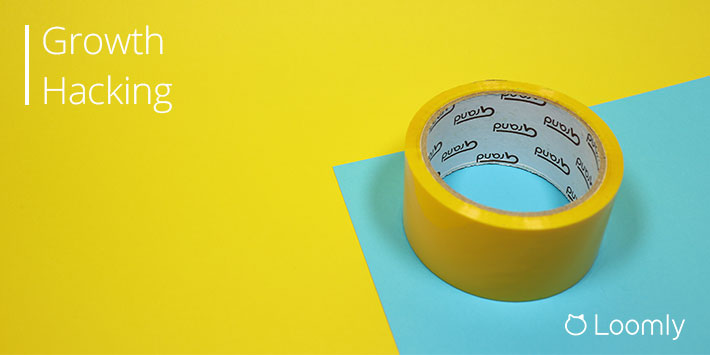Today we are going to look at content-focused growth hacking.
Specifically, five growth hacks to help you:
- Save money
- Increase views
- Grow your audience
- Connect with the right customers
Better still:
These growth hacks can be used by brands and marketing teams of any size, on any budget. The only prerequisite is your motivation to grow!
Let’s get started.
Growth Hack #1: Create “Trickle-Down” Facebook & Instagram Ads
A simple growth hack to increase your Facebook & Instagram Ads’:
- Engagement
- Conversion
- Reach
Is to promote interaction in the comments section.
You can do this by creating what we call “trickle-down” ads.
These are ads where:
- The content starts in the main body copy
- And ends in the comments
Basically, the content trickles down from top to bottom.
As LiveMentor‘s former CMO Jessy Grossi pointed out on the (French) Mantra podcast, all of those comments are positive signals to Facebook that this is a meaningful ad, and should be seen by more relevant people.
There are three easy ways you can take advantage of “trickle-down” ads:
Split Your Body Copy
The first technique is to split your ad’s content between the:
- Body copy
- First comment
Here is an example of a (boosted) post, where the copy starts in the post and trickles down into the first comment:
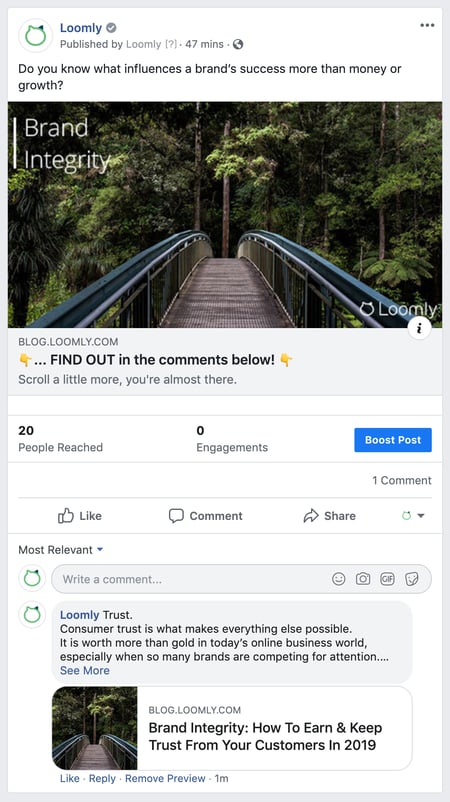
We find this technique works well with curiosity-focused content. You grab user’s attention with the main body text…
…then you satisfy their “completionist” needs in the first comment.
Create A Comment-Based Q&A Session
The second technique is to transform the comments section into a Q&A session.
This is a place where users can directly:
- Ask questions
- Get answers
The more questions you generate, and the better answers you give, the more interaction you are going to see. This can also be in the form of likes on existing answers.
One way to get the ball rolling is by asking members of your community to ask the first few questions.
Alternatively:
You could create a FAQ section in the comments. You can add the most common questions as the comments and the answers as the sub-comment.
Like here:
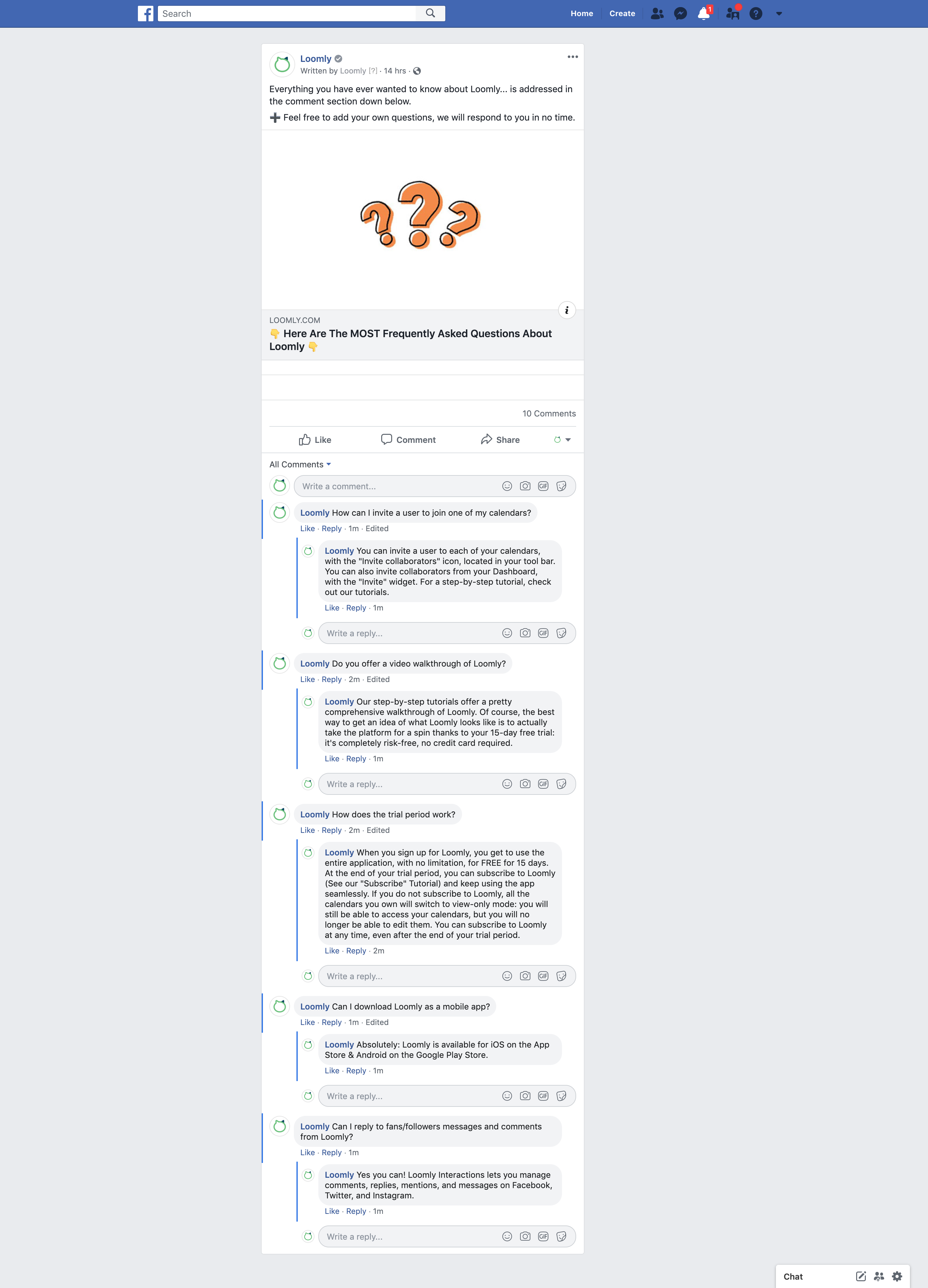
Users can then interact with existing answers or expand on the questions you have provided.
Create A Comment-Based Competition
The final way to do this is to create a competition where comments count as entries.
The simplest options are to:
- Ask a relevant question
- Create a comment-based poll
But you can also get creative and ask users to write longer-form answers, like mini-essays or to share personal experiences.
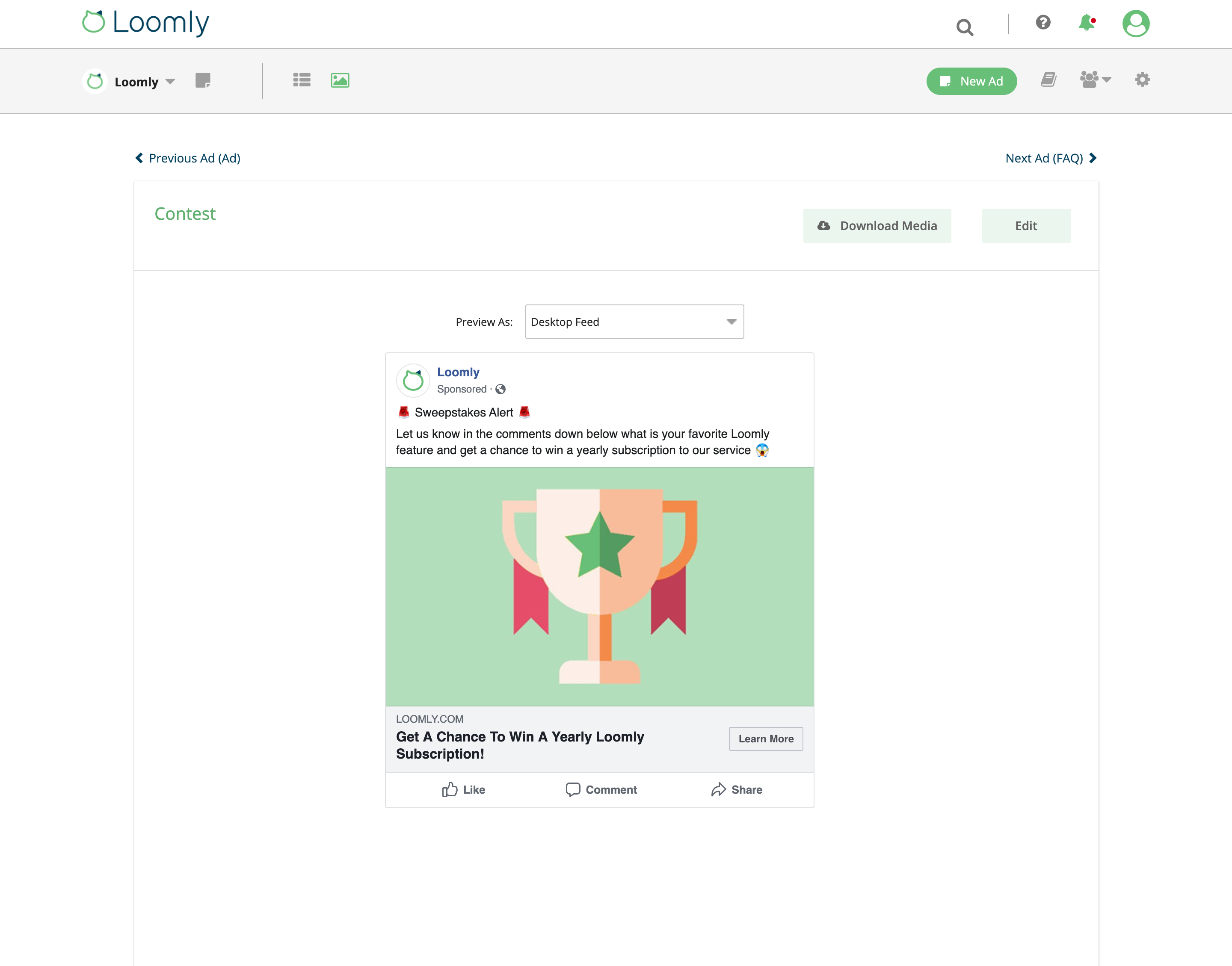
This can create interaction both with your ad and among your target audience.
Launch Trickle-Down Facebook & Instagram Ads With Loomly
- First, create a trickle-down ad with Loomly Ads Manager:
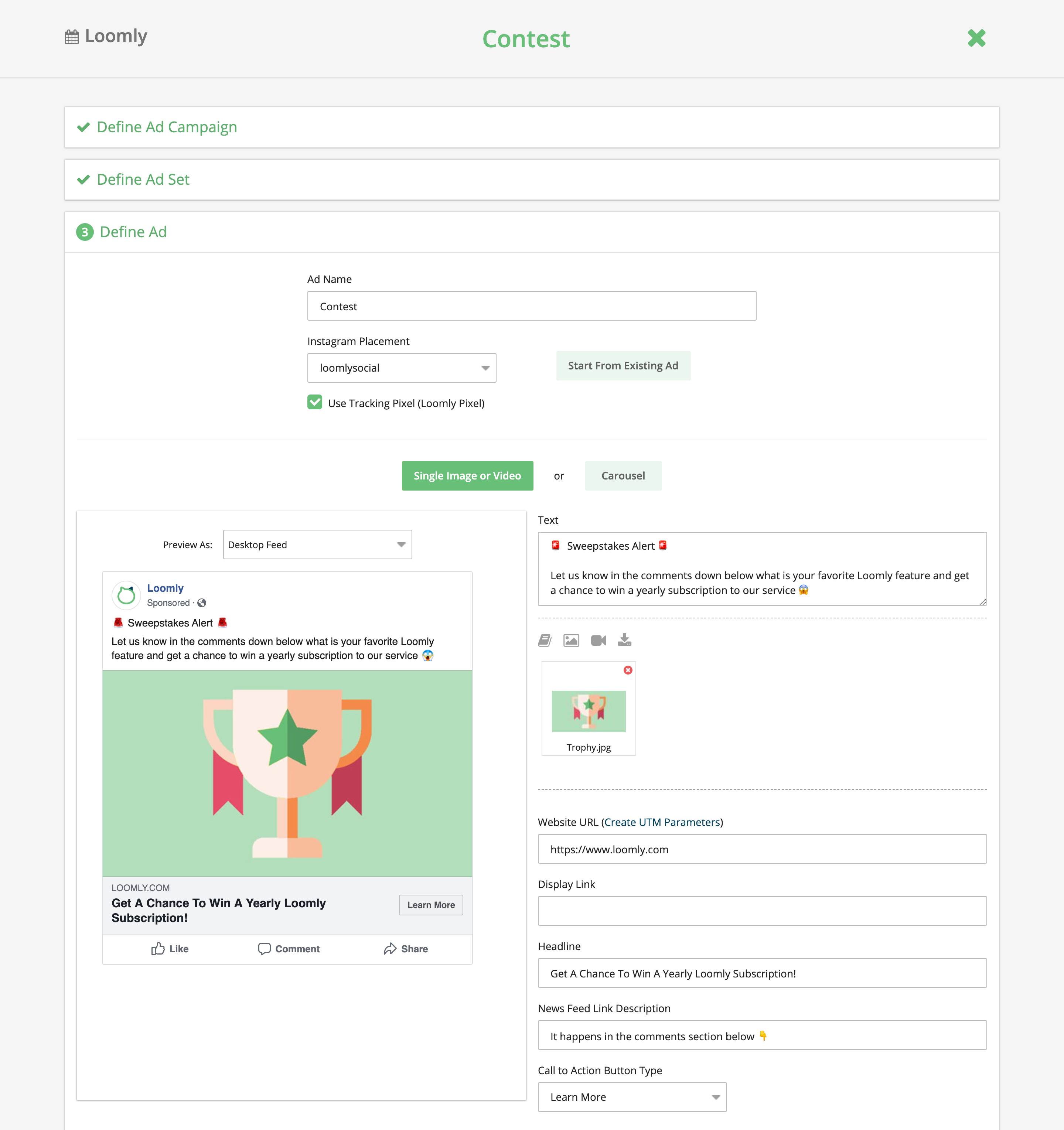
- Then, manage the comments you receive on that ad with Loomly Interactions:
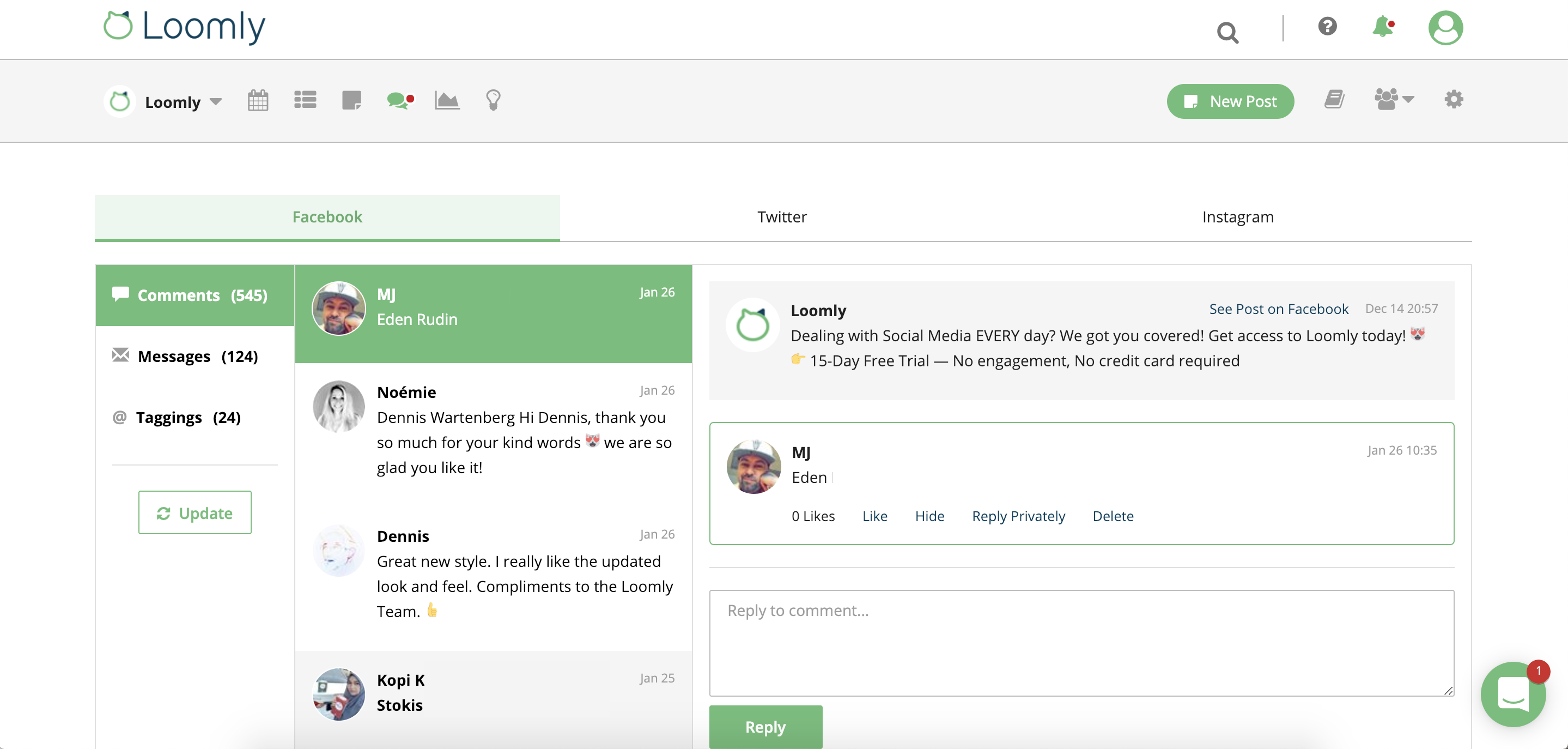
Growth Hack #2: Add Videos To Your Posts For Better SEO Rankings
Dwell time is the amount of time that people spend on your page. And, many SEO experts will tell you this is a factor that impacts your search engine rankings.
Why?
Because the amount of time spent on a page should correlate with a user’s satisfaction.
For content like:
- Articles
- Tutorials
- Landing pages
- Product pages
It is safe to say that the longer a user spends on your page, the more likely it is that they have found the content they were looking for.
This tells Google your content is a good fit for this search and can help improve its ranking.
Brian Dean, the founder of Backlinko, says one of the most effective ways to improve dwell time is to embed relevant videos into the text.
The thinking is that the time spent watching the video automatically counts toward the time spent on your page. This could be an extra minute or more!
These videos can:
- Provide supporting information
- Create context
- Showcase your products
- Visualize steps in a tutorial
Depending on the topic the page is about.
ASOS, the online fashion retailer, does this well on their product pages by using videos of models wearing the chosen piece:
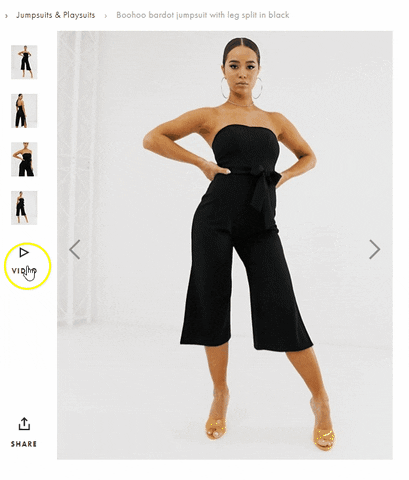
Upgrading content pages with videos provides both a better user experience to their customers and increases their dwell time on the page: it is a win/win!
This is a best practice we like to follow on the Loomly blog, as we have found that videos tended to offer a complementary perspective to the written content of our articles.
On the practical side, you can add videos to your posts in two different ways.
You can either:
- Create videos yourself.
- Use third-party videos.
Regardless of the method you pick, you can leverage YouTube to embed a video into a post (whether it is a video you produced and uploaded or a third-party video from someone else).
Choose your video, select share, then embed, and copy the code into your website:
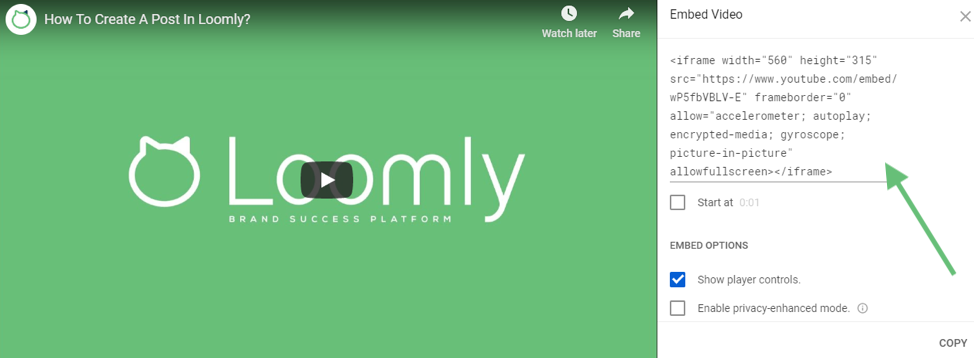
Speaking of videos:
Growth Hack #3: Extend The Life Of Your Videos (And Reach More People!)
It is no secret: video content is (increasingly) pivotal to communicate efficiently online.
However, one challenge marketing teams tend to face is creating enough content to meet demand.
Simply put: you often may not have the time or resources to create endless video content.
Well, there is a growth hack for that:
- Create one main piece long-form video content
- Edit it into bite-size chunks
- Publish the chunks as standalone updates
For example:
The NFL did this superbly to celebrate its 100th season.
They created multiple long-form television shows breaking down the “top 100” of various topics from the league’s 100-year existence.

Each of these videos was then broken down into a shorter YouTube video:

Then each individual segment was turned into a standalone social media video.
This resulted in a 100 tweet thread with millions of views and interactions:
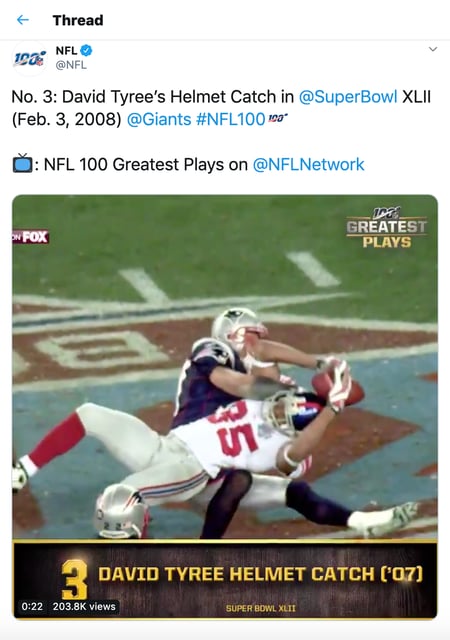
Now, you may not have an NFL-sized budget (or 100 years of content) to draw from.
So, what should you do?
Well, the good news is that this technique applies to all types of long-form video, like:
- Webinars
- Live streams
- Q&A sessions
- Product reviews
- Vlogs
Take a look at this webinar our CMO, Noemie, hosted about Loomly Ads Manager:
In this 40-minute video, she breaks down every way you can use Loomly to create, publish, and manage your social media.
The video is split into five sections:
- Activate
- Connect
- Create
- Preview
- Push
All we need to do is take these five sections and edit them into standalone videos and use them as:
- Standalone social media updates
- Video steps in a tutorial
- Sections in a five-day email course
- Answers to specific support questions
We can also use the structure of the webinar to create an outline for a long-form blog post tutorial on how to use Loomly Ads Manager.
This stops our webinar from being a one-and-done piece of content — and allows it to help us reach new people, help existing customers and grow our content library.
Growth Hack #4: Create Intent-Based Facebook Audiences
Facebook retargeting offers tons of opportunities for content-based growth hacking.
If you are not sure what Facebook retargeting is, here is a fundamental summary of how it works:
- You install the Meta Pixel on your site.
- This tracks users visits and behavior.
- You can then tailor ads to them based on what they have done (or not).
You can see why this is such a powerful tool, right?
However:
Marketing teams often spend a lot of time and money on people who are not going to buy their products.
Why?
Because they target everybody who has ever been to their site.
The problem is: most industry conversion rates sit between two and four percent. That is a lot of non-buying visitors!
You can get around this by using this intent-based growth hack.
The first step is to push some top-of-the-funne website content to your audience:
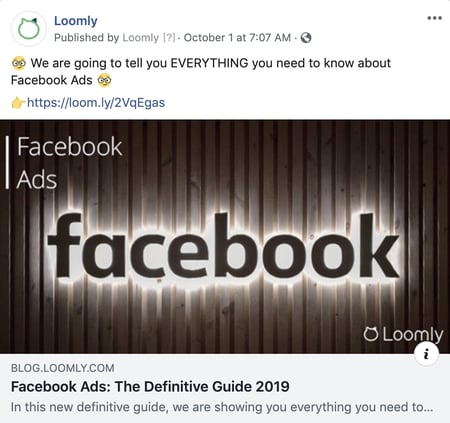
These are the posts that create social engagement, like:
- List posts
- News stories
- Informational landing pages
- Evergreen guides
You can then use the Meta Pixel to track user behavior on your site.
Specifically, you will want to target people who already visited intent-based URLs on your website, such as those ending in:
- /checkout
- /subscribe
- /download
This shows these particular users have progressed through your marketing funnel. They have also shown a significant interest in what you make — they may even have subscribed to your newsletter — but have not triggered a conversion just yet.
From there, you can tailor your audience by including those URLs to your Facebook Audience, while excluding the URLs of your actual conversion pages (think: /thankyou or /order-confirmation page):
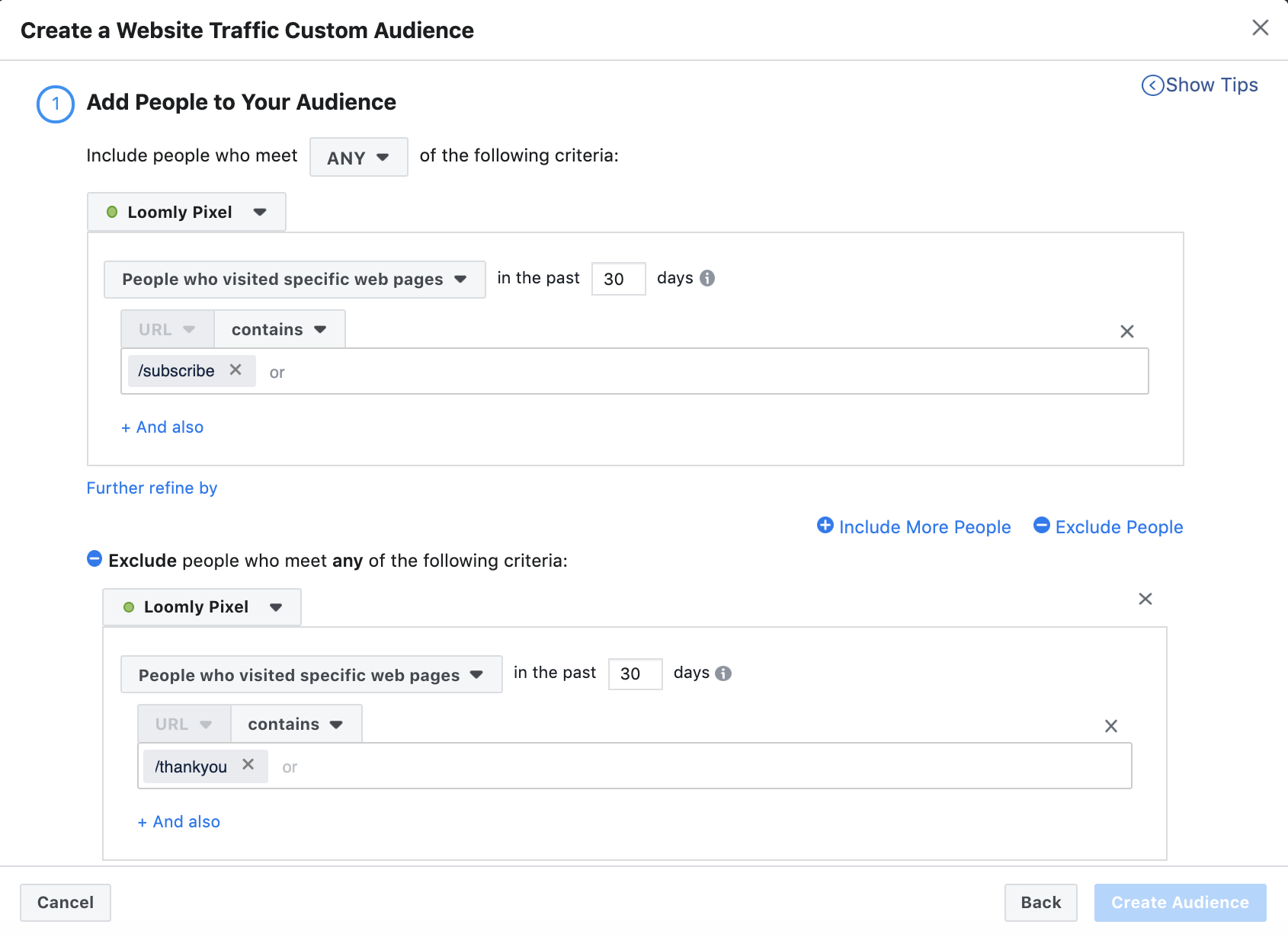
You can then push additional content for the next stage of the funnel out to this surgically-defined audience.
Read on, because: this is where you want to tread with finesse.
A conventional way of leveraging retargeting from here would be to offer some kind of discount as part of a direct conversion campaigns, in order to bring back users exactly where they left off and trigger a purchase, subscription or download.
While this seems effective on paper, it may also end up positioning you as a transactional brand, and as such, increase price sensitivity rather than create value and loyalty.
A more advanced way of proceeding is to promote middle of the funnel content to this audience, for instance through a case study or a success story, that will remind them that they were very close to benefiting from your product or service until they left your website.
Since it takes a wide potential audience and makes it really narrow, this strategy ensures you are getting a much higher return on ad spend (ROA) — meaning you can invest the dollars you spared on other marketing initiatives.
Growth Hack #5: Grow Your Top Exec’s LinkedIn Profile
LinkedIn is an exceptional platform when it comes to building two very specific types of brands: employer brands & B2B brands.
Nevertheless, LinkedIn at its core is a people-focused platform, composed of users looking to connect with other influential people in their network and industry.
This represents a significant opportunity for marketing teams, who can not only leverage their main Company Page to tell their brand story, but also turn their top execs into spokespersons.
Shopify’s COO Harley Finkelstein does this brilliantly:
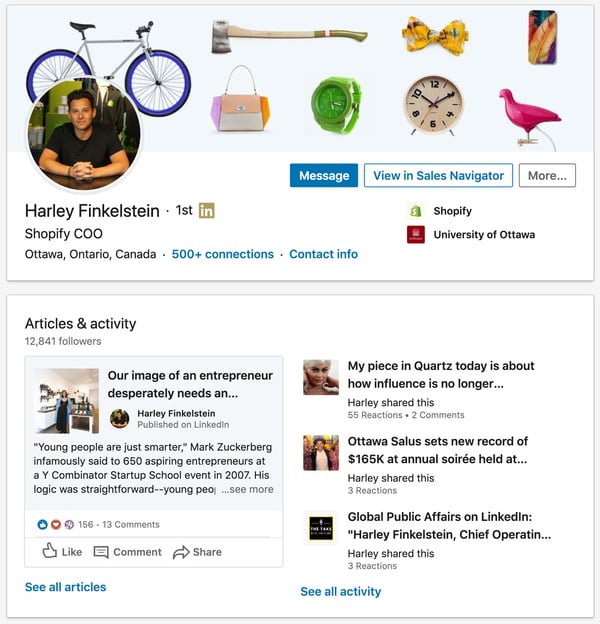
Over time, Harley has built a loyal audience of 12K+ followers (and counting), which fuels the Shopify brand, in a very authentic way.
To be clear: the essence of this growth hack is not to replace the presence of your company on LinkedIn with a personal profile; instead, it is to complement the brand story your organization tells in a formal manner through your Company Page, with a warmer, more natural fashion through one or multiple leaders’ profiles.
Easily Build Your LinkedIn Profile With Loomly
- Loomly allows you to connect both LinkedIn Company Pages and LinkedIn Profiles to your calendars:
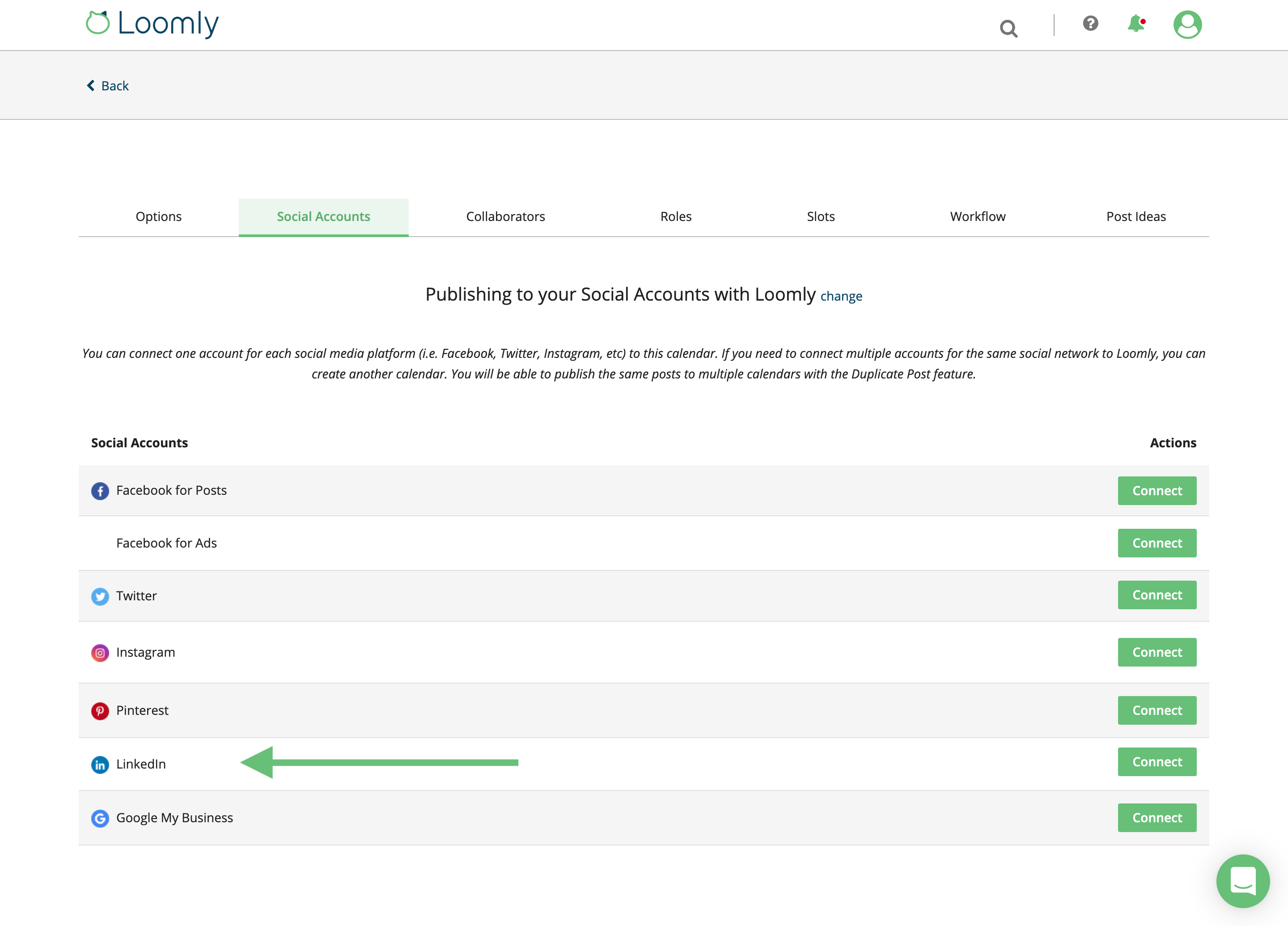
This empowers your team to share content between what you want to publish as a team, and what you want your top exec to publish in their name.
- In fact, this is a strategy we leverage ourselves at Loomly, by using three calendars, which makes it incredibly easier for everyone in our team to keep in sync about what we are posting:
- The Loomly calendar is where we focus on all corporate communication.
- The Team calendar is where we make content available for our team members from which to draw inspiration from.
- The CEO calendar is where Thibaud plans posts on his own social accounts.
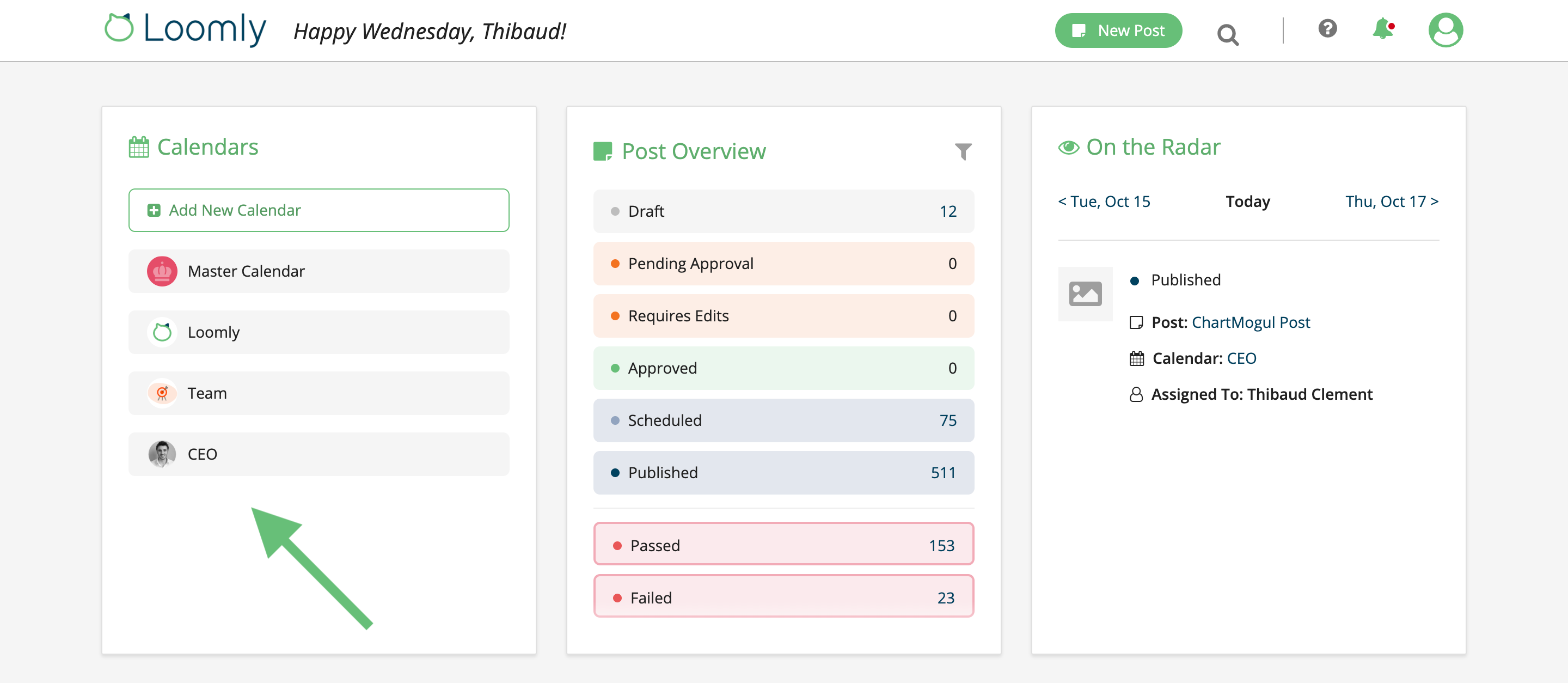
Content-Based Growth Hacking, In A Nutshell
These growth hacks are designed to help you ensure your next marketing campaign is your best one yet.
So, we hope you have picked up a few tricks to help you do just that!
Here are those five growth hacks again:
- Create “trickle-down” Facebook ads: to increase engagement and organic reach
- Add videos to your posts: to increase “dwell time” and your rankings
- Extend the life of your videos: by editing them into standalone content for other channels
- Create intent-based Facebook audiences: and reach those most likely to buy
- Grow your CEO’s LinkedIn profile: and leverage users’ desire for human connection
